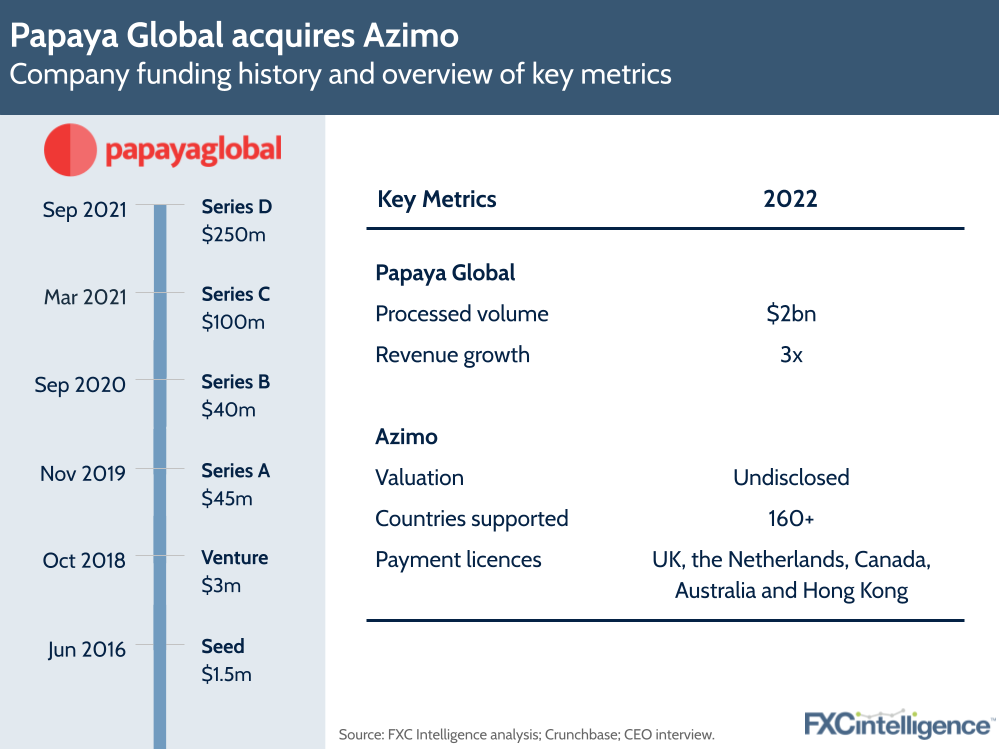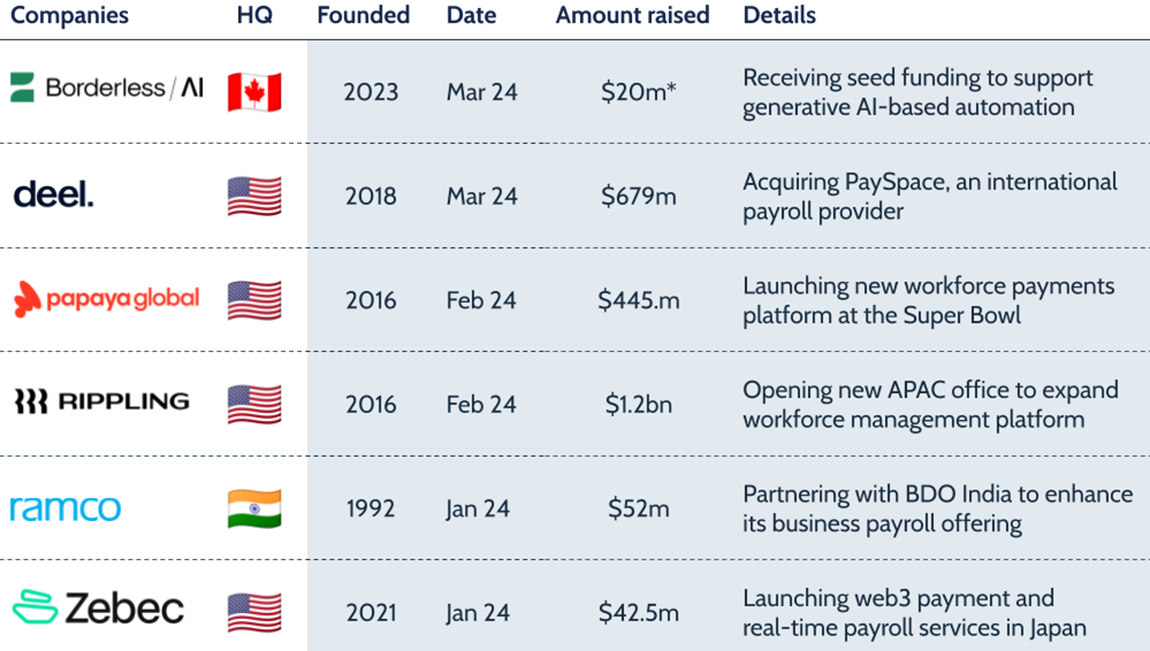Payroll platform Papaya Global has bought remittance player Azimo. Daniel Webber caught up with Papaya Global CEO Eynat Guez to discover the motivations for the deal.

At the end of March, Israel-based international payroll provider Papaya Global announced that it was acquiring London-based remittance provider Azimo.
Aside from MoneyGram’s private equity acquisition, it is one of the bigger acquisitions in the sector in recent years, and an unusual one. Azimo has a very different core customer to Papaya – a remittance worker compared to a white-collar professional – and while both companies are fintech growth stories, Papaya’s recent growth is at the hyper-growth triple-digit level. Founded in 2012, Azimo has raised a total of $88.1m in funding across seven rounds, while the 2016-founded Papaya Global has also had seven rounds, raising $444.5m in total.
The terms of the deal have not been disclosed, and while multiple news outlets have reported a price of between $150-200m, CEO Eynat Guez indicated to me that this is not correct. However, she sees the acquisition of Azimo as being a valuable addition to Papaya.
“It’s a good company. It’s a good business. It’s quite a large business,” she says.
The motivations behind Papaya Global’s acquisition of Azimo
The nature of Papaya Global’s offering, global payroll management for clients, means that from the outset the company has sought partners to build payment solutions that are tailored to the needs of payroll.
“It’s a very different structure to other payments,” explains Guez, adding that while a conventional cross-border payment sees a company focus on competing on cost and efficiency, a payroll payment is far more complex. Not only is the payment divided into multiple transactions, but the company needs to ensure that it is paid in compliance with several different factors.
“I need to ensure that I’m paying you the net amount in a way that lets the authorities at your bank understand that this is a payroll transaction, because in the majority of the countries a payroll transaction is actually a super transaction,” she says.
“It will define your credit liability. It will sometimes define your cost of insurance. It’s much stronger than just a regular transaction, so I need to classify it correctly. That money will be paid to net payments, to taxes, to benefits and to third-party payments.”
This complexity means that Papaya needs to have the correct infrastructure in place to communicate this information in every country it operates in. Traditionally, this has required the company to have partnerships with highly prescriptive service-level agreements that ensure every employee paid through its system is paid on the prescribed day and no later. And with Papaya now managing around $2bn in payroll, its needs are significant and highly global.
With this in mind, Guez was reviewing two types of companies as potential partners: B2B payments providers and remittance companies, the latter of which she saw as having closer commonalities with the needs of Papaya Global.
“They are very global; they need to be very, very fast and they’re looking for the most direct way to transfer funds because for them being direct is actually also very cost effective and obviously very important.”
With this in mind, Azimo is expected to be a key addition to the company.
“We were looking for someone with the expertise, with the ability to have strong compliance and who already has a global footprint and global money transfer licenses, which are key,” she says.
“The first intention was not M&A, but I think we both felt that there is a much bigger opportunity here to build this through an M&A and really join forces.”

Integrating Azimo into Papaya Global
As the acquisition progresses, Guez plans to ultimately merge all of Azimo’s operations under the Papaya Global brand.
“[Remittances] is definitely not going to be our main business. We did not [buy Azimo] in order to set up a new line of business,” she says.
“But in order to utilise their technology, their expertise, their team, and to transition this to B2B and to paying employees eventually and funds, we haven’t decided yet. We’re probably going to retain the current business on a low scale.”
In the long run, Papaya Global may decide to add remittance capabilities as one of a suite of financial services offered to its customers and their employees.
“We are looking eventually, as part of our strategy, to offer more and more employee-related financial services. This might be part of the offering.”
The Papaya Global customer
Azimo is joining a company that currently caters to a broad range of clients in terms of size, encompassing everything from SMBs up to enterprise customers. However, they all have some commonalities.
“We normally serve clients that already have very strong angles on compliance,” explains Guez.
“They want to have full control. They want to digitise everything. They’re looking to innovate everything that is related to their payroll. We normally don’t do blue-collar businesses.”
This is somewhat at odds with the employers of typical remittance workers, but Guez does anticipate a future evolution in the customers the company serves, which may see greater customer synergies between Papaya and Azimo.
“The global world is becoming more complex and challenging both on compliance and regulation, but also on money transfer between countries and setting up bank accounts and so on. On the other hand, there is more and more fraud coming to this area of payroll,” she says.
With this in mind, she believes that over time Papaya’s global payroll payment capabilities will attract businesses that would not traditionally have been drawn to Papaya, as companies shift from thinking about payroll as a human capital management issue handled by HR.
“From my perspective, payroll is the biggest expense that you have in a company, so it’s definitely a finance service and the biggest liability as well,” she says, adding that eventually companies would have “the ability to track and monitor every single transaction that they’re doing to someone, the ability do it quickly and the ability to run centralised payment hubs”.
“Even if we’re looking at the very big companies and organisations of the world, they’re not managing P&L for every single country,” she says.
“They’re sending quite a lot of international funds and remittance, and we will just be able to do it for them in a much more sophisticated and efficient way.”
Crypto salary payments now and tomorrow
As with the rest of the payments space, the potential integration of crypto is increasingly being explored. Papaya has responded with the ability to enable employees to receive up to 30% of their salary in cryptocurrency – a service that it first launched in late 2017.
However, Guez is skeptical about the current viability of crypto salary payments.
“Currently the market is still a bit blocked, because people that understand crypto normally understand that the offers to exchange their salaries with crypto payments are super expensive,” she says.
“This is why we are very cautious about it: the exchange rates, the commissions, are so expensive. The ones that understand the cost say it’s a rip off, and the ones that don’t understand might do it the one time, but then they’re very concerned about how they exchange it back to fiat.”
Here she believes that current market efforts in this space are “not being handled properly”.
“If we are looking at it as an employee benefit, it’s a very expensive benefit and you don’t provide end to end,” she explains. “If I want to give you a real benefit, I need to give you very competitive pricing.”
She adds that other essential components need to include the ability to convert back into fiat, as well as “hassle-free” tax declarations and similar.
“We are also building this part internally in Papaya. The reason that we are doing it internally is because we think that eventually, if we cannot offer a very competitive, very end-to-end offering, we don’t want to be part of that. That’s something we’ll have by the end of the year.”
The rise of global payroll as a service
Papaya Global is not the only company operating in the payroll space, which has become increasingly crowded over the past few years. There are a number of high-profile US-only players, including TriNet, Gusto and Rippling, while internationally Guez describes the market as “still very fragmented”.
“You have companies like ADP Global, CloudPay and so on that will do the global payroll piece. You have tons of new employer of record (ER) providers,” she says.
“I treat it currently like Groupon; this is a trendy business. So you have Deel, Oyster, Omnipresent, Remote and Multiplier – every day there is a new one out there – which are only doing the ER and contractor side, which is more of a transactional business.”
Guez says that the company differentiates itself by covering ER, contractor and payroll, but also enabling rapid integration and consolidation, regardless of the varying sizes of teams based in different countries. The company offers its services on a software-as-a-service basis, charging per employee in a manner that enables customers to scale from one employee per country up to hundreds, thousands or beyond.
“I know that a lot of the competitors are using the term global payroll on the ER side, but they’re literally trying to confuse the market,” she says.
“We are not trying to gain the transactional employees that you are looking for a way to hire, but we are looking to be the core of your payroll in your organisation. And then we can process everything from onboarding through payroll processing.”


